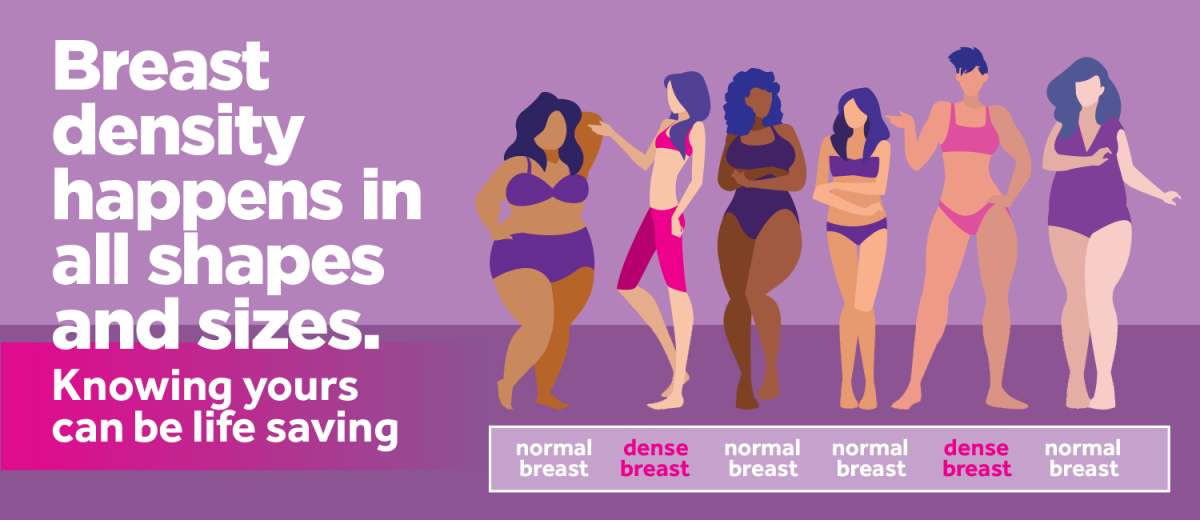CATEGORIES OF BREAST DENSITY
Nearly half of all women aged 40 and older who have mammograms are found to have dense breasts (either heterogeneously or extremely dense). Women with 50 percent or higher breast density are three times more likely to be diagnosed with breast cancer than women with less than 10 percent breast density (Journal of the National Cancer Institute, Aug 2011).
Type A
Almost Entirely Fatty
*Categories of Breast Density
Type B
Scattered Areas of Fibroglandular Density
Type C
Heterogeneously Dense
Type D
Extremely Dense
SMART BREAST MRI™ IN NEW JERSEY
Women with dense breasts can benefit from supplemental screening with one of Princeton Radiology’s Smart Breast MRIs™. Smart Breast MRI™ can detect more than twice as many breast cancers as 3-D mammography alone – and often at earlier, more treatable stages.
Smart Breast MRI™ is a non-invasive imaging exam without ionizing radiation. Patients lie in the MRI machine, while an extremely safe contrast agent is administered intravenously into the arm. The MRI machine then uses magnets and radio waves to produce detailed 3-dimensional images of the breast tissue.
On the Smart Breast MRI™, the contrast agent becomes more concentrated in areas of cancer growth, showing up as white areas against a dark background. This helps radiologists determine which areas may be of concern.
WHICH SCENARIO APPLIES TO YOU?
An average or high risk of breast cancer or concerns due to family history or other reasons
You’re likely to be a candidate for our Diagnostic Smart Breast MRI™. Click here to learn more about that specific exam.
No history of breast cancer, but have dense breasts and want to be proactive about my breast health
You’re likely to be a candidate for our Smart Breast MRI™. Click here to learn more about that specific exam.
Types of Smart Breast MRI™ Exams
Princeton Radiology offers both Diagnostic Smart Breast MRI and Screening Smart Breast MRI™. Most insurance plans cover Diagnostic Smart Breast MRI™ for women at increased risk of developing breast cancer, such as those with a Claus risk score of 20+ on their SmartMamm™ report, and/or an inherited conditions such as BRCA 1 or BRCA 2 genetic mutations. Get your Claus score here
If a Diagnostic Smart Breast MRI™ exam is not covered by your insurance, our Screening Smart Breast MRI™ is available for the low, self-pay fee of $375.
Diagnostic Smart Breast MRI™
- Exam time: approx. 30 minutes
- Recommended as a follow up to a SmartMamm® if you have an average risk of breast cancer, but have concerns due to family history or other reasons
- A physician’s order is required
Additional reasons to consider a Diagnostic Smart Breast MRI™ include:
- General concerns about breast health and risk factors not resolved with a mammogram
- Discovery of a lump/mass during a physical exam, ultrasound or mammogram
- Concerns about the integrity of breast implants
- Distinguishing between scar tissue and recurrent tumors
- Staging of breast cancer to make the best treatment decisions
Screening Smart Breast MRI™
- Exam time: approx. 10 minutes
- Recommended for concerned patients and their doctors when referral for diagnostic breast MRI does not meet insurance coverage requirements
- Not covered by most insurance plans; out-of-pocket cost: $375
- A physician’s order is required
Additional reasons to consider a Smart Breast MRI™ include:
- Dense breasts and/or an average risk of breast cancer
- Additional safety net that detects 15 to 18 more breast cancers per 1,000 screenings
- Ability to reveal aggressive cancers, as it detects tumors that are vascular and can grow quickly in between annual mammograms
Not sure about your risk of breast cancer? Click here to find out.
WHAT IF THE RESULTS ARE ABNORMAL?
A small percentage of breast MRIs require additional testing. These might include a follow-up diagnostic Smart Breast MRI™, breast ultrasound, diagnostic SmartMamm® (mammogram), or biopsy.
DO I STILL NEED TO HAVE MAMMOGRAMS?
Yes! Even with dense breasts, mammograms are the only imaging exam proven to reduce breast cancer mortality. Mammograms also help detect changes in the pattern of your breast density, which is critical for detecting breast cancer early. We recommend that you continue with annual mammograms.






